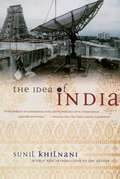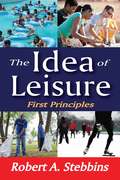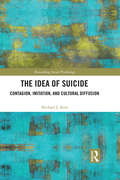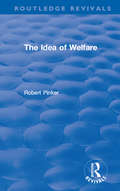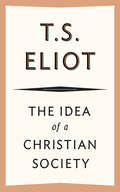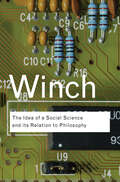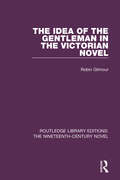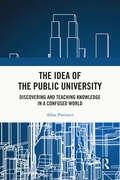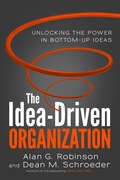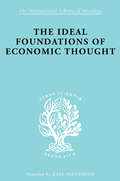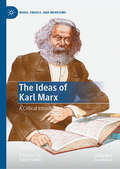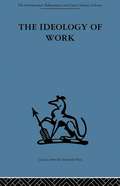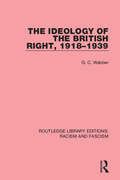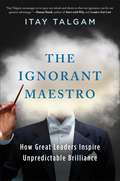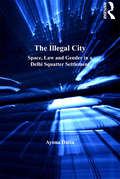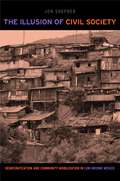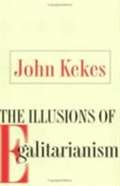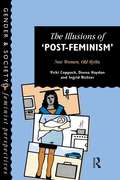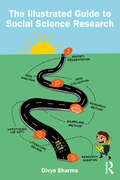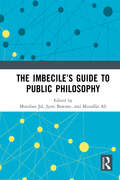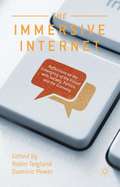- Table View
- List View
The Idea of India
by Sunil KhilnaniThe key book on India in the post nuclear era, with a new Introduction by the author. Our appreciation of the importance of India can only increase in light of the recent revelations of its nuclear capabilities.
The Idea of Leisure: First Principles
by Robert A. StebbinsA range of thinkers in philosophy, religion, and the social sciences have argued that thanks to science, technology, and the organization of society, the human condition has improved and will continue to do so. People are becoming progressively happier and enjoying an ever-improving quality of life, they say, mostly because they are putting their skills and reason to work. The Idea of Leisure is based on the assumption that leisure also fits into the social order, and it provides a singular vector by which to measure progress, even though it is rarely mentioned in writings about the idea of progress. Robert A. Stebbins believes that leisure fosters positive development in both the individual and community. Progress through free-time activity may sometimes be hard to grasp because of the all-too-common manifestations of deviant behavior from schoolyard bullying to date rape. Despite these examples, the vast majority of leisure activities often have profound, positive consequences for participants and society. Stebbins makes a solid case for linking leisure with progress. Although leisure has huge importance for humanity, observations about the idea of leisure as part of the idea of progress have been sporadic. It is no accident that the World Leisure Organization promotes the motto: "Leisure: integral to social, cultural, and economic development." Nor is it an accident that Article 24 of the United Nations Universal Declaration of Human Rights declares that: "Everyone has the right to rest and leisure, including reasonable limitation of working hours and periodic holidays with pay." For whole nations to find satisfaction and self-fulfillment based on leisure would be a true sign of progress. Stebbins' book offers original insight into this basic human requirement.
The Idea of Social Science and Proper Phenomenology (Sophia Studies in Cross-cultural Philosophy of Traditions and Cultures #28)
by Jonathan TuckettThis monograph examines an academic discipline in crisis. The author claims that this field concerned with society and relationships is in trouble. No one can seem to agree on what it does or how to go about doing it. His insightful argument revives the thought of key phenomenologists often no longer considered in social science. Looking predominantly at debates within religious studies, this book uncovers certain misguided presuppositions which have strongly influenced scholars in the field. This reflects itself in a Weberian Ideal regarding the institutional place of science in the universities and a failure to properly consider the epistemic status of knowledge produced for its own sake. But even recognizing these issues will not get to the core of the crisis. It will not help scholars better understand what it is to be human. To address this, the author digs deeper. He draws on the philosophical phenomenology of Husserl’s Phenomenological Movement to critique our very idea of social science. In the process, he presents a radical approach to the question of humanity. This volume concludes that, properly understood, social science is a hobby. It deserves no special place in the university. Indeed, if it is to be pursued properly, it requires a fundamentally revised understanding of humanity. The author argues this not of the sake of controversy. Rather, his intention is to affect the necessary shift in our understanding that will enable future constructive solutions.
The Idea of Suicide: Contagion, Imitation, and Cultural Diffusion (Researching Social Psychology)
by Michael J. KralThis book is about a new theory of suicide as cultural mimesis, or as an idea that is internalized from culture. Written as part of a new, critical focus in suicidology, this volume moves away from the dominant, strictly scientific understanding of suicide as the result of a mental disorder, and towards positioning suicide as an anthropologically salient, community-driven phenomenon. Written by a leading researcher in the field, this volume presents a conception of suicide as culturally scripted, and it demonstrates how suicide becomes a cultural idiom of distress that for some can become a normative option.
The Idea of Welfare (Routledge Revivals)
by Robert PinkerOriginally published in 1979, The Idea of Welfare critically reviews the concepts of egoism and altruism as they are expressed in residual and intuitional models of social welfare. The book describes the way in which the scope and limits of obligation and entitlement are determined in practice by the interplay of familial, communal, national and international loyalties. It also looks at the similarities and differences between economic and social forms of exchange and mutual aid. These major themes are developed in a comparative review, which explores the effects of social change on the ways in which people seek to preserve and enhance their welfare through self-help and collective action. The book focuses on Britain, the USA and Russia, it challenges conventional definitions of welfare, largely concerned with formal social policies sponsored by government and uses historical material to illustrate the dominant forms of a mutual aid which were practised before the development of modern welfare states.
The Idea of a Christian Society
by T. S. EliotOne of the twentieth century&’s great thinkers and writers explores what it means to incorporate Christian values into our worldly lives. Originally delivered in 1939 at Corpus Christi College, these three lectures by the renowned poet and playwright T. S. Eliot address the direction of religious thought toward criticism of political and economic systems. With sincerity and intellectual rigor, the Nobel Prize winner asks whether—and how—it is possible for Christianity to coexist with Western democracy and capitalism.
The Idea of a Social Science and its Relation to Philosophy
by Peter WinchIn the fiftieth anniversary of this book's first release, Winch's argument remains as crucial as ever. Originally published in 1958, The Idea of a Social Science and Its Relation to Philosophy was a landmark exploration of the social sciences, written at a time when that field was still young and had not yet joined the Humanities and the Natural Sciences as the third great domain of the Academy. A passionate defender of the importance of philosophy to a full understanding of 'society' against those who would deem it an irrelevant 'ivory towers' pursuit, Winch draws from the works of such thinkers as Ludwig Wittgenstein, J. S. Mill and Max Weber to make his case. In so doing he addresses the possibility and practice of a comprehensive 'science of society'.
The Idea of the Gentleman in the Victorian Novel (Routledge Library Editions: The Nineteenth-Century Novel #16)
by Robin GilmourFirst published in 1981, this book represents the first comprehensive examination of Victorian society’s preoccupation with the ‘notion of the gentleman’ and how this was reflected in the literature of the time. Starting with Addison and Lord Chesterfield, the author explores the influence of the gentlemanly ideal on the evolution of the English middle classes, and reveals its central part in the novels of Thackeray, Dickens and Trollope. Combining social and cultural analysis with literary criticism, this book provides new readings of Vanity Fair and Great Expectations, a fresh approach to Trollope, and a detailed account of the various streams that fed into the idea of the gentleman.
The Idea of the Public University: Discovering and Teaching Knowledge in a Confused World
by Allan PatienceThis book sheds light on the risk of losing the authoritative knowledge discovered and taught by public universities. It argues that public universities are as indispensable now, as never before, for providing governments and citizens with reliable knowledge crucial for confronting the looming environmental, cultural, economic, and political challenges now threatening humanity’s very existence. Acknowledging the history of universities around the world, the book highlights the role they have played in creating and curating knowledge. It examines John Henry Newman’s liberal idea of the university and Wilhelm von Humboldt’s conception of the institution and argues this is all under threat at the hands of fake prophets and biased media preaching "alternative facts" and populist falsehoods. Shedding light on neoliberalism and the tensions between research, education and training, the author demonstrates that the best pedagogical and economic outcomes are achieved when these interests are dynamically informing each other. This book will be of interest to academics, university managers, and higher education policy makers questioning the role, value and purpose of the contemporary public university.
The Idea-Driven Organization: Unlocking the Power in Bottom-Up Ideas
by Alan G. Robinson Dean M. SchroederToo many organizations are overlooking, or even suppressing, their single most powerful source of growth and innovation. And it's right under their noses. The frontline employees who interact directly with your customers, make your products, and provide your services have unparalleled insights into where problems exist and what improvements and new offerings would have the most impact.In this follow-up to their bestseller Ideas Are Free, Alan G. Robinson and Dean M. Schroeder show how to align every part of an organization around generating and implementing employee ideas and offer dozens of examples of what a tremendous competitive advantage this can offer. Their advice will enable leaders to build organizations capable of implementing 20, 50, or even 100 ideas per employee per year. Citing organizations from around the world, they explain what's needed to put together a management team that can lead the type of organization that embraces grassroots ideas and describe the strategies, policies, and practices that enable them. They detail exactly how high-performing idea processes work and how to design one for your organization. There's constant pressure today to do more with less. But cutting wages and benefits and pushing people to work harder with fewer resources can go only so far. Ironically, the best solution resides with the very people who have been bearing the brunt of these measures. With Robinson and Schroeder's advice, you can unleash a constant stream of great ideas that will strengthen every facet of your organization.
The Ideal Foundations of Economic Thought (International Library of Sociology)
by Werner StarkPublished in 1998, The Ideal Foundations of Economic Thought is a valuable contribution to the field of Sociology & Social Policy.
The Ideas of Karl Marx: A Critical Introduction (Marx, Engels, and Marxisms)
by Stefano PetruccianiThis book offers a complete presentation of the most important themes of Marx’s thought, following the development of Marx’s theory from the beginning to his death and offering a reconstruction and analysis that covers the whole of Marx’s life and works. Each chapter presents one of the central topics of Marx’s reflection: the confrontation with the Hegelian theory of the State (1843); the critique of political liberalism in the “On the Jewish Question”; the discovery of Political Economy in the Manuscripts of 1844; the new theory of history developed in The German Ideology; the political theory and the revolution of 1848; the critique of political economy from the Grundrisse to Capital; and the political thought of the last Marx (the Paris Commune and the critique of the German Social Democratic Party).Stefano Petrucciani is Professor of Political Philosophy at the University of Rome La Sapienza, Italy.
The Ideology of Managerialism: Fragments of a Future Theory (Routledge Studies in Management, Organizations and Society)
by Thomas KlikauerThe term “managerialism” is widely used not only in the world of business and government and this book details the theory behind the illusive idea. It distinguishes between management and managerialism and highlights the two groups pushing managerialism, namely corporate apparatchiks and the apostles of managerialism, and outlines twelve key ideas shaping managerialism. These twelve ideas range from profits to ideology, from economic growth and markets to business ethics and corporate social responsibility, from quantification to dehumanisation, from exploitation to short-termism, environmentalism, and homogenisation. Ultimately, this research volume illuminates the pathologies of managerialism and its impact on society, business, government, and the defining issue of our time – global warming. The objective of this book is to move simply beyond using the term “managerialism” by creating a better understanding of it. This means exploring the theory behind managerialism as well as the ideologies that define it. It will be of value to researchers, academics, practitioners, and students looking to gain a deeper understanding of managerialism and how managerialism can be overcome, with particular interest to those in the fields of critical management studies, leadership, corporate governance, and organisational studies.
The Ideology of Tyranny
by Guido Giacomo PreparataThe contemporary jargon of political correctness and the so-called "politics of diversity" so prevalent in the academic and administrative discourse of the United States can be traced to the fantastic sociology of an obscure French pornographer, Georges Bataille (1897-1962). The celebration of violence sung in his works, re-elaborated in abstract form by the late followers of Bataille, has led to the creation of a peculiar talk emphasizing difference, antagonism, intellectual despair, and a profound political conservatism. This bookascribes the late state of paralysis affecting dissent in America to the adoption of a peculiar gospel of divisiveness, which was promoted in the Eighties by importing from France the "theories" of philosopher Michel Foucault. "
The Ideology of Work (International Behavioural And Social Sciences Ser. #Vol. 71)
by P D AnthonyTavistock Press was established as a co-operative venture between the Tavistock Institute and Routledge & Kegan Paul (RKP) in the 1950s to produce a series of major contributions across the social sciences. This volume is part of a 2001 reissue of a selection of those important works which have since gone out of print, or are difficult to locate. Published by Routledge, 112 volumes in total are being brought together under the name The International Behavioural and Social Sciences Library: Classics from the Tavistock Press. Reproduced here in facsimile, this volume was originally published in 1972 and is available individually. The collection is also available in a number of themed mini-sets of between 5 and 13 volumes, or as a complete collection.
The Ideology of the British Right, 1918-1939 (Routledge Library Editions: Racism and Fascism #8)
by G.C. WebberThis book, first published in 1986, examines the activities and beliefs of right-wing Conservatives and overt Fascists in inter-war Britain. It analyses the role that ideology played in the various struggles between leaders and dissidents within the Conservative Party, traces the development of central themes in right-wing thought and seeks to show how the complexity of these beliefs established ideological barriers to the growth of Fascism in Britain which, it is argued, was heavily reliant upon the support of disillusioned Conservatives for its limited success. In this way the book contributes to our understanding of both the Conservative Party and the British Fascist movement between the wars, and in doing so helps to establish an overview of right-wing politics in Britain since the turn of the century. It also contains an appendix of information on lesser-known individuals and organisations on the Right.
The Ignorant Maestro
by Itay Talgam"Choosing ignorance might seem a terrible quality to exhibit in your workplace--a sure path down the stairs and out the corporate door. But stick with me here and see how it leads you upward. You'll understand why great leaders embrace ignorance and use it to elevate their people to new heights of achievement."A conductor in front of his orchestra is an iconic symbol of leadership--but what does a true maestro actually do to enable the right sort of cooperation among his players, leading to an excellent performance? If you think his primary job is making sure the musicians play the right notes, prepare to be surprised.For twenty years, in addition to conducting orchestras around the world, Itay Talgam has been a "conductor of people" for companies large and small, for CEOs of Fortune 500 companies as well as startup entrepreneurs, and beyond. Drawing on his decades of experience on the podium, he teaches nonmusicians how conducting really works and how the conductor's art can help leaders in any field.In his lectures (including an acclaimed TED talk) and now in this book, Talgam shows why imposing your vision on your people is likely to backfire. Great conductors may know in advance how they want a piece to be played, but they make room for the creativity and passion of their musicians. They respect the gap between the baton and the instruments. They focus more on listening than on speaking. And they embrace their own ignorance, knowing that others may have better ideas than the conductor can imagine.Talgam explores the nuances of leadership by describing the distinctive styles of six world-famous conductors: the commanding Riccardo Muti, the fatherly and passionate Arturo Toscanini, the calm Richard Strauss, the gurulike Herbert von Karajan, the dancing Carlos Kleiber, and the master of dialogue Leonard Bernstein. All took different approaches to the age-old leadership dilemma: how to maximize both control and creative freedom at the same time.The Ignorant Maestro will empower you to help your own team make even more beautiful music. Talgam's anecdotes and insights will change the way you think about listening, humility, and the path to unpredictable brilliance.From the Hardcover edition.
The Ignorant Schoolmaster: Five Lessons In Intellectual Emancipation
by Kristin Ross Jacques RancièreThis extraordinary book can be read on several levels. Primarily, it is the story of Joseph Jacotot, an exiled French schoolteacher who discovered in 1818 an unconventional teaching method that spread panic throughout the learned community of Europe. Knowing no Flemish, Jacotot found himself able to teach in French to Flemish students who knew no French; knowledge, Jacotot concluded, was not necessary to teach, nor explication necessary to learn. The results of this unusual experiment in pedagogy led him to announce that all people were equally intelligent. From this postulate, Jacotot devised a philosophy and a method for what he called "intellectual emancipation"--a method that would allow, for instance, illiterate parents to themselves teach their children how to read. The greater part of the book is devoted to a description and analysis of Jacotot's method, its premises, and (perhaps most important) its implications for understanding both the learning process and the emancipation that results when that most subtle of hierarchies, intelligence, is overturned. The book, as Kristin Ross argues in her introduction, has profound implications for the ongoing debate about education and class in France that has raged since the student riots of 1968, and it affords Ranciere an opportunity (albeit indirectly) to attack the influential educational and sociological theories of Pierre Bourdieu (and others) that Ranciere sees as perpetuating inequality.
The Illegal City: Space, Law and Gender in a Delhi Squatter Settlement (Gender, Space and Society)
by Ayona DattaThe Illegal City explores the relationship between space, law and gendered subjectivity through a close look at an 'illegal' squatter settlement in Delhi. Since 2000, a series of judicial rulings in India have criminalised squatters as 'illegal' citizens, 'encroachers' and 'pickpockets' of urban land, and have led to a spate of slum demolitions across the country. This book argues that in this context, it has become vital to distinguish between illegality and informality since it is those 'illegal' slums which are at the receiving end of a 'force of law', where law is violently encountered within everyday spaces. This book uses a gendered intersectional lens to explore how a 'violence of law' shapes how 'public' subjectivities of gender, class, religion and caste are encountered and negotiated within the 'private' spaces of home, family and neighbourhood. This book suggests that resettlement is not a condition that squatters desire; rather something that is seen as the only way out of the 'illegal' city. The wait for resettlement is a temporal space of anxiety and uncertainty, where particular kinds of politics around law, space and gender takes shape, which transform squatters' relations with the state, urban development, civil society, and with each other. Through their everyday struggles around water, sanitation, social and political organisation and the transformation of their homes and families, this book shows that the desire for the 'legal city' is also the irony and utopia of home, which will remain an incomplete gendered project - both for the state and for squatters.
The Illusion of Civil Society: Democratization and Community Mobilization in Low-Income Mexico
by Jon ShefnerMuch has been written about how civil society challenges authoritarian governments and helps lead the way to democratization. These studies show that neoliberal economic policies have harmed many sectors of society, weakening the state and undermining clientelistic relationships that previously provided material benefits to middle- and low-income citizens, who are then motivated to organize coalitions to work for greater social justice and equality. Recognizing this important role played by civil society organizations, Jon Shefner goes further and analyzes the variegated nature of the interests represented in these coalitions, arguing that the differences among civil society actors are at least as important as their similarities in explaining how they function and what success, or lack thereof, they have experienced. Through an ethnographic examination extending over a decade, Shefner tells the story of how a poor community on the urban fringe of Guadalajara mobilized through an organization called the Unión de Colonos Independientes (UCI) to work for economic improvement with the support of Jesuits inspired by liberation theology. Yet Mexico’s successful formal democratic transition, won with the elections in 2000, was followed by the dissolution of the coalition. Neither political access for the urban poor, nor their material well-being, has increased with democratization. The unity and even the concept of civil society has thus turned out to be an illusion.
The Illusions Of Egalitarianism
by John KekesIn this systematic and scathing attack on the dominant contemporary version of liberalism, John Kekes challenges political assumptions shared by the majority of people in Western societies. Egalitarianism, as it's widely known, holds that a government ought to treat all citizens with equal consideration. Kekes charges that belief in egalitarianism rests on illusions that prevent people from facing unpleasant truths. <p><p> Kekes, a major voice in modern political thought, argues that differences among human beings in the areas of morality, reasonability, legality, and citizenship are too important for governance to ignore. In a rigorous criticism of prominent egalitarian thinkers, including Dworkin, Nagel, Nussbaum, Rawls, Raz, and Singer, Kekes charges that their views present a serious threat to both morality and reason. <p> For Kekes, certain "inegalitarian truths" are obvious: people should get what they deserve, those who are good and those who are evil should not be treated as if they had the same moral worth, people should not be denied what they have earned in order to benefit those who have not earned it, and individuals should be held responsible for their actions. His provocative book will compel many readers to question their faith in liberalism.
The Illusions Of Post-Feminism: New Women, Old Myths (Gender And Society Ser.)
by Vicki Coppock Deena Haydon Ingrid RichterFirst Published in 1995. Routledge is an imprint of Taylor & Francis, an informa company.
The Illustrated Guide to Social Science Research
by Divya SharmaThis accessible and engaging textbook helps students to get to grips with key concepts, issues, and practices in social science research through the use of fun and informative illustrations and examples. Written and illustrated by an experienced teacher of research methods in the social sciences, each chapter explains research concepts while using everyday examples and illustrations to make applied research comprehensive to students. It explains the step-by-step process for carrying out research through a range of topics and approaches, including survey research, research ethics, sampling, and experimental research. Chapters also include learning objectives, class activities, key terms, helpful hints, and suggestions for further reading. This book will be essential reading for any undergraduate research methodology class in the social sciences.
The Imbecile’s Guide to Public Philosophy
by Murzban JalThis book studies the role of serious philosophizing in everyday life and looks at how authoritarianism negates philosophical and public reason. It sheds light on how philosophy can go beyond its life as a discipline limited to an esoteric group of academia to manifest itself via radical discursive practices in public life which enable us to understand and resolve contemporary socio-political challenges. It studies philosophy as a discipline which deals with one's orientations based on experience, the logic of reasoning, critical thinking, and most of all radical and progressive beliefs. The book argues that the contemporary rise of capitalism in modern society, resonating Émile Durkheim’s cautions on "anomie", has favoured individualism, differentiation, marginalization, and exploitation, balanced on an eroding collective consciousness and a steady disintegration of humanity and reason. Taking this into consideration, it discusses how philosophy, both mainstream and marginal, can revive democracy in society which then is able to confront global authoritarianism led by the figure of the imbecile. Finally, it also provides a range of new perspectives on the questions of civic freedom, hegemony of language, social justice, identity, invisible paradigms, gender justice, democracy, multiculturalism, and decolonization. This book is an invigorating compilation of essays from diverse disciplines, engaging the need to create a humanistic public philosophy to transcend the state of imbecility. It will be of great interest to students, scholars and researchers of philosophy, contemporary politics, history, and sociology, as well as general readers.
The Immersive Internet
by Robin Teigland Dominic PowerCollecting short thought pieces by some of the leading thinkers on the emerging 'Immersive Internet', Power and Teigland's book questions what a more immersive and intimate internet - based on social media, augmented reality, virtual worlds, online games, 3D internet and beyond - might mean for society and for each of us.
